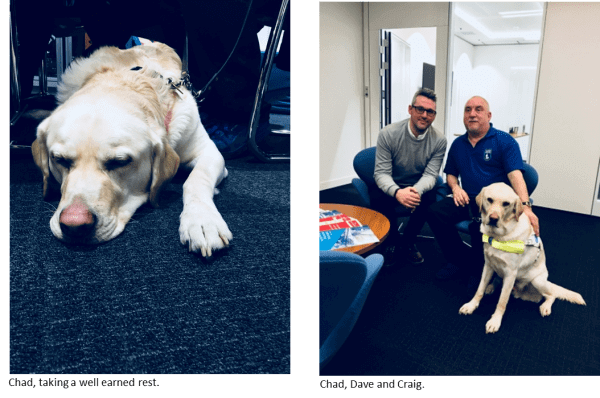This year we are delighted to be partnering with Guide Dogs.
The Guide Dogs for the Blind Association is a British charitable organisation founded in 1934. Guide Dogs helps blind and partially sighted people across the UK through the provision of guide dogs, mobility and other rehabilitation services.
We recently held a firm quiz night and were joined by Craig, Dave, his Guide dog Chad – see photos below.
Dave gave a fantastic talk about the life-changing services that Guide Dogs provide to those with sight loss.
Guide Dogs are responsible for 8000 dogs and every penny that is raised will go towards the lifetime cost of a guide dog which is around £55,000.
With over 4,950 guide dog owners in the UK, every little helps.
- £30.00 could help to support a working guide dog partnership for a week
- £60.00 could buy an Off to School Kit for a puppy moving into its first stage of training
For more information about Guide Dogs and the amazing work they do please click here.

The acts that passed through the German Parliament to enable ratification of the Unified Patent Court (UPC) Agreement are now being challenged by the opposition party, Alternative für Deutschland (AfD).
The AfD have called for the repeal of the acts that have put Germany in a position to ratify the Agreement. Uncertainty remains around whether the pan-European Unitary Patent Agreement will therefore come into effect.
In the meantime, with the UK government in a position to ratify the Agreement, the IP Federation (representing British industry) and the Law Society are urging the government to ratify before the end of March; the target date for agreeing the transitional arrangements for Brexit.
To discuss further, contact your Mathys & Squire attorney.
The 28th February 2018 saw the EU Commission release a draft “Withdrawal Agreement” outlining the provisional arrangements for the United Kingdom to withdraw from the EU and from the European Atomic Energy Community.
The text will undergo further review by both the European Council and Brexit Steering Group of the European Parliament before being presented to the UK Government for further negotiation and, as such, is still subject to change.
Key Points
No unexpected guidelines relating to IP.
EU trade mark, design and plant variety rights holders will enjoy comparable registered and enforceable IP rights in the UK via replication of their existing EU registrations.
These UK registrations will not be re-examined by the UK Intellectual Property Office and no charges will be levied.
The information required for the registration will be provided to the UK authorities by the EU Intellectual Property Office, the Community Plant Variety Office and the European Commission.
Patents are unaffected
The text will be welcomed by EU-wide rights holders since it suggests that no loss of rights will occur on account of Brexit.
For the full draft text, click here and keep an eye out for further updates on our News and Insights page.
To discuss further, reach out to your attorney.
The UK Intellectual Property Office (UK IPO) has announced changes to UK patent fees to be introduced from 6 April 2018. Despite increases in both pre-grant fees and some post-grant renewal fees, the UK fees remain competitive compared to patent fees elsewhere around the world.
Notable changes include the introduction of fees for excess claims and description pages. Although common in other jurisdictions, these have not been charged at the UK IPO before. Some fee increases can be avoided by making payments for existing applications early, before the new fees come in on 6 April.
New Excess Claims Fees
Introduced at a rate of £20 per claim over 25 claims, these excess claims fees will form part of the search fee, which must be paid within 12 months of the priority date. Failure to pay excess claims fees will result in the entire application being deemed withdrawn, unlike at the EPO where failure to pay simply results in the additional claims over 15 being considered withdrawn. Since amendment of the claims before search is at the discretion of the UK IPO, applicants should consider the number of claims carefully before filing.
New Excess Pages Fees
Introduced at a rate of £10 per page over 35 as part of the examination fee, these will be payable 6 months from publication of the application. The fees apply only to description pages and not to the claims or drawings pages.
Application Fees
Increase from £20 to £60 with a new £15 surcharge for payment after filing.
Renewal Fees
Increase by £10 each from year 12 onwards as part of the UK IPO’s continued strategy to cover the majority of its costs from renewal fees, rather than pre-grant fees.
Discounts
Discounts for paying fees electronically will increase to £30 for each of the application, search and examination fees.
Contact your Mathys & Squire attorney today to discuss what you may be able to do by way of, for example, early fee payment on existing UK applications and filing strategies for future Patent Applications.
Further information on the UK IPO amendments can be found here.
Discontinuation of reduced search fee for many European regional phase applications
The EPO has announced that for applications that enter the European regional phase from 1 April 2018, the 190 EUR reduction in the supplementary search fee if the International Search Report (ISR) was drawn up by the US, Japanese, Korean, Chinese, Russian or Australian patent office, will no longer be available. See here.
Therefore applicants who selected the US, Japanese, Korean, Chinese, Russian or Australian patent office as International Searching Authority (ISA) may wish to consider entering the European regional phase before 1 April 2018, so that the 190 EUR reduction in the search fee is still available.
Expansion of window in which third-year renewal fee can be paid
Rule 51(1) EPC will be amended so that from 1 April 2018, it will be possible to pay the third year renewal fee up to six months before it falls due. Because the third year renewal fee falls due 24 months after the filing date of the application, this may make it possible for applicants who have filed a PCT application to pay the third year renewal fee upon European regional phase entry. Applicants can, of course, still pay the third year renewal fee closer to the due date if desired. Please note that all renewal fees other than the third year renewal fee remain unaffected, and so cannot be validly paid more than three months before their respective due dates. See here.
Change in appeal fee
The appeal fees due at the EPO are also changing. From 1 April 2018, there will be two levels of appeal fee: See here.
- For appellants that are either (a) a natural person, or (b) a small- or medium-sized enterprise, a non-profit organisation, a university or a public research organisation, the appeal fee will remain at 1,880 EUR. An EPO notice gives guidance as to what is classified as a small- or medium-sized enterprise, a non-profit organisation, a university or a public research organisation. See here.
- For all other entities, the appeal fee will increase to 2,255 EUR.
Other fee changes
There are a number of other amendments to the rules relating to fees that will come into force as of 1 April 2018:
- The fee for an international search on an international application will be reduced by 100 EUR, from 1,875 EUR to 1,775 EUR;
- The fee for preliminary examination of an international application will be reduced by 100 EUR, from 1,930 EUR to 1,830 EUR;
- The reduction in the examination fee due on a European regional phase application for which the EPO drew up an international preliminary examination report will be increased from 50% to 75%.
Proposed introduction of ability to postpone start of examination by three years
The EPO has also launched a consultation on introducing an optional postponement of the start of examination. This is ostensibly in response to feedback from pharma/biotech companies. In summary, the intention would be to allow applicants to request a postponement of the start of examination by three years, if the request is filed within six months of supplementary European search or six months from European regional phase entry. The consultation indicates that the intention is for the new procedure to enter into force on 1 July 2018, and be published in the November 2018 edition of the EPO Guidelines for Examination.
We will, of course, keep you informed if this new procedure is brought into force.
Chris Hamer, one of the world’s leading attorneys in the field of ionic liquid technologies, and Matthew Morton have recently produced an article for a peer-reviewed journal (Separation and Purification Technology – an Elsevier publication) on the topic of ionic liquid technologies.
A journal publication was researched and written by Chris and Matthew, which looks at the at developments in ionic liquids in relation to patent claims and other trends in patents relating to ionic liquid-based technologies. The purpose of the article was to analyse some of the trends in patent filings in the field of ionic liquids specifically and to use this information to provide an indication of how the transfer of ionic liquids from academic labs to commercial industries is developing.
The article was peer reviewed and accepted for publication in the journal on 10 Nov 2017 to be published alongside new peer-reviewed academic research in the field of ionic liquids.
Please click here to read the full article.
We are pleased to announce that we will be sponsoring the Stationers’ Company Innovation Awards for the second time in 2018.
Through its Innovation Excellence Awards, the Stationers’ Company recognises the key role the Communications and Content industries play in the UK economy, highlights outstanding innovation in the sector and offers the opportunity to share best practice.
Alan MacDougall, Partner at Mathys & Squire, says: “This is the second year in which Mathys & Squire has supported the Stationers’ Company Innovation Excellence Awards. As one of Europe’s most highly regarded intellectual property firms, we are passionate about innovation and entrepreneurial spirit. It is good to see both coming readily to the fore in all sectors of the communications and content industries and showcased through this Awards programme.”
Entries close on 6th April 2018. Please click here for more information and an application form.
To read the full press release please click here.
The UK is a high-value food and beverage market with a large customer pool. The UK is also home to many blue-chip food and beverage manufacturers requiring high quality, cutting-edge ingredients.
This Industry Briefing highlights how Danish companies can not only break into this lucrative space, but (more importantly) thrive in the highly competitive UK market.
Intellectual Property law firm Mathys & Squire will be joined by industry experts (EBS, Giant Peach) and UK government (Public Health England, Department for EInternational Trade) to provide guidance on:
- Establishing a foothold in the UK market;
- Current trends and regulations;
- Gaining an edge over established competitors; and
- Avoiding commercial pitfalls.
Programme
14.30 Registration
14.45 Welcome by Industry Briefing Host: Mathys & Squire LLP
- The current state of the UK food and beverage market, and how to gain a competitive edge:
- Jamie Methuen, Public Health England
- Hans Monberg, Department for International Trade
- Martin MacLean and David Hobson, Mathys & Squire
15.35 Market access:
- Martin Williams, EBS Ltd
- James Read, Giant Peach
- Andrew Little, Food Matters Live
- Deanne Lintorn, DKUK
16.45 Beer/Drinks and Networking
17.30 End of Programme
Registering for the event: To register please email [email protected] or click here to sign up online.
Date: 13th March 2018
Location: British Embassy Copenhagen, Kastelsvej 36-40, 2100 København Ø, Denmark
For more information about our expertise in the food sector please click here.

We asked some of the Mathys & Squire team to share their predictions for 2018, and trends they think their clients should look out for!

David Hobson considers IP changes in the Agri-tech sector..
CRISPR/Cas9 genome editing technology has come a long way since its initial conception in the early 2010s, and promises to revolutionise the future of molecular biology and Agri-Tech in particular. The CRIPSR/Cas9 system allows researchers to easily and specifically edit genomes, overcoming many of the attendant difficulties of working with eukaryotes, such as plants. In combination with the newly-developed use of the system to control gene activation without genome editing (see Liao et al (2017), Cell, 171, 7, 1495-1507) and the involvement of tech giants such as Microsoft in refining the system, those working in the field of Agri-Tech are now in possession of an expanding toolbox of techniques.
We predict this will lead to rapid development in the field over the coming years, helping to address the demands for food production by an ever-expanding world population. However, the CRISPR/Cas9 patent landscape is highly complex and businesses seeking to use this technology will need to seek Freedom to Operate advice.
The Agri-Tech team at Mathys & Squire is well-placed to offer such advice, and has a wealth of experience in this technical area.
If you have any questions for David please contact him at [email protected].

Svilen Mirtchev predicts some of the changes that clients should look out for when registering their designs..
1. More clarity regarding Community (European) Registered Designs (CRDs) after the UK’s departure from the EU
It is expected (or at least hoped) that the consequences of the UK’s departure from the EU (expected around March 2019) on CRDs will become more apparent in 2018. In particular, a major outstanding concern is whether it will be possible to convert existing CRDs into UK Registered Designs and, if so, the process for doing so.
2. The UK Government will join the Hague Agreement for internal design registrations.
In recent years the Hague Agreement has seen renewed interest as an increasing number of – major – territories have signed-up to the Hague Agreement. The UK Government intends to join the Hague Agreement in 2018, which means that applicants using this international design system will have direct access to the UK Registered Design system.
3. US to lead CRD filings, but China is closing in.
Consistently, US applicants file the most CRDs out of all non-EU applicants. The volume of CRD filings by Chinese applicants has increased exponentially in recent years; whilst this growth is flattening, China is nonetheless closing in on the US. 2018 could therefore mark the year in which China – for the first time – files more CRDs than the US, or at the very least the numbers will be the closest yet.
If you have any questions for Svilen please contact him at [email protected].

Laura Clews looks at some interesting trends in the food sector..
1. Alcohol-Free Drinks
Many of the changes we are seeing in the food industry are based around growing consumer awareness regarding their health.
In line with this, alcohol–free drinks are predicted to be a major growth area in 2018 due to the fact that millennials are consuming less and less alcohol. It has been noted that consumers aren’t satisfied with drinking endless glasses of cranberry juice or tonic water, and so are looking for something more exciting when they head to the bar.
One company stepping up to fill the gap is Seedlip, a UK based company, producing alcohol-free distilled spirits, already available in Fortnum & Mason, Selfridges and Michelin-starred restaurants such as The Fat Duck.
It is expected that we will see many other companies investing in exciting new alcohol-free drinks to meet consumer demand in 2018.
2. Heme
One of the most cutting edge areas of food science is the use of heme to produce environmentally sustainable meat alternatives.
Food-Tech start-up company, Impossible Foods, use heme to bring a more realistic meaty taste to their plant based burgers. Impossible burgers use genetically engineered yeast to produce leghemoglobin, a heme similar myoglobin (a protein abundant in animal muscles which binds oxygen and gives meat its unique flavour and aroma) to create the authentic taste and texture.
Impossible Foods boasts that its plant-based burger not only bleeds and sizzles when it cooks but the manufacture of these burger uses about 1/20th the land, 1/4th the water, and produces 1/8th the greenhouse gas emissions compared to traditional beef burgers.
For those of you desperate to get your hands on one of these meaty meat-free burgers, the US based firm, Impossible Foods, are expected to launch their product in the UK in early 2018.
3. Lab manufactured meats
For the carnivores amongst us, lab-grown meat (also known as “clean meat”) is set to make a big impact in 2018. Lab-grown meat is produced by using stem cells form a living animal to grow muscle tissue which is then processed into food product and is predicted to be available in supermarkets in 2018. Meat formed in this way may not be appealing to all consumers, however the production process is considered to have numerous benefits, including a significantly reduced impact on the environment compared to traditional animal farming methods. In addition, lab-grown meat can be engineered to contain increased amounts of protein or decrease the amount of saturated fat, and so can be a healthier meat choice for consumers. Growing meat in a laboratory instead of farming animals can also minimise animal-borne diseases and pathogens, such as Salmonella, Campylobacter and E. coli.
Lab-grown meat appears to be a new worldwide trend with China signing a $300-million deal to import cultured meat from Israel, and both Bill Gates and Richard Branson are also believed to have invested in U.S. company Memphis Meats, which also produces lab-grown meat products.
4. Sugar Reduction
Reducing sugar levels in food and drinks was a huge trend in 2017, and 2018 looks to continue this trend. Companies, such as Nestle, are finding new and innovative ways to reduce sugar levels in food and drink whist maintaining the taste and texture expected by consumers.
Such innovation includes producing new sweetener combinations and the use of hollowed sugar crystals.
With the introduction of the higher sugar tax on drinks in April 2018, we believe that we will see a number of different solutions relating to reduced sugar food and drinks emerging in 2018.
5. Veganism
Veganism was one of the biggest food trends in 2017 and the number of people turning to a meat-free lifestyle is not expected to slow down in 2018. This change in consumer purchasing is considered to be driven younger generations selecting healthier and more environmentally friendly food options.
A survey by The Vegan Society in 2016 showed that over 542,000 people in the UK are now following a vegan diet and the Mirror reported that there was a 987% increase in demand for vegetarian options this year.
The food industry appears to be following the consumers new desire to go meat-free and are providing new and exciting product to make vegetarianism and veganism easier and tastier than ever before.
If you have any questions for Laura please contact her at [email protected].

Michael Charlton reviews changes in the telecoms sector..
2018 promises to be a crucial year in the development of standards for fifth generation mobile technologies. The International Telecommunications Union’s IMT-2020 framework as well as discussions borne out of 3rd Generation Partnership Project (e.g. 3GPP TS22.261, which defines the service requirements for 5G systems) and European Telecommunications Standardisation Institute (ETSI) standardisation meetings, have defined a very ambitious and stringent set of requirements for 5G networks. In particular, improvements to latency (i.e. the delay when signalling in the network), capacity targets and efficiency gains, as well as the application of these requirements to use cases such as the Internet of Things (IoT), Virtual Reality (VR) and network slicing, will be of particular importance. I believe that not all of these ambitious requirements can be achieved (at least in the short term due to the limits of available technology) and consequently companies will not focus their research on just one or two of these requirements (as they have done with earlier standards) but will instead research many more of the requirements. Therefore, I expect that the clients I work with who are working in this area will start to file new patent applications over a wider range of technologies and use cases.
With a range of applications and patents at their disposal, applicants and proprietors will be able to increase their impact on the standardisation process as well as, of course, increase the number of their patents which are essential to a given standard. This is particularly important given the fierce competition in the telecommunications field.
Of particular note, 3GPP are due to publish the “Release 15” specification for the first phase of the 5G networks in June of this year –we look forward to continue drafting and prosecuting our clients’ patent portfolios and advising our clients as regards the essentiality of their patents with respect to such standards.
If you have any questions for Michael please contact him at [email protected].

Andrew White discusses developments in the engineering sector..
With the announcement last year that the Government plans to ban the sale of new diesel and petrol cars by 2040, it is no surprise that there has been a large uptake in electric and hybrid vehicles. In fact, there are now more than 125,000 plug-in vehicles on the road today compared to just 3500 in 2013. With similar announcements made in France and other European countries, and the introduction of the “T-charge” in central London, we can expect to see the growth in hybrid and electric vehicles increase this year. This, of course, brings with it associated problems – such as whether there is sufficient charging infrastructure to support this growth, and how the National Grid will cope.
With the acquisition of our client Sevcon last year (who specialise in controllers for electric motors) by US Tier 1 automotive company Borg Warner (see news story here) we can expect to see Intellectual Property in this sector – whether in terms of mergers and acquisitions, or from new players on the block – growing and becoming increasingly prominent in 2018.
The Engineering team at Mathys & Squire LLP are well placed to meet this growth with their experience in battery, hybrid and electric motor technologies and their presence in the North East with existing clients and membership of the North East Automotive Alliance.
If you have any questions for Andrew please contact him at [email protected].
James Pitchford (Partner) and Clare Collins (Technical Assistant), members of Mathys & Squire’s Agri-Tech team, recently attended this year’s LAMMA agricultural machinery show in Peterborough. As a firm we are regular attendees of the show, and were pleased to go again this year and to visit the exhibition spaces of a number of leading companies in the farm equipment field.
James commented, “The vast array of companies exhibiting at LAMMA offered us a good opportunity to discuss intellectual property matters with a wide range of people from across the Agri-Tech sector, and to learn about recent developments in this field. It was also great to see a number of patented inventions on display.”
For Clare, who is training to become a patent attorney and has a background in engineering, the diverse range of patented products on display was notable. She commented that “The scale of this event makes you realise that innovation in this sector is not just about the big machines such as tractors and combine harvesters, but that it extends into more niche areas such as lighting, tool parts, and even the inside of hose pipes!”
James added that “It was also interesting to hear exhibitors’ thoughts on the value of patents. The majority of people we spoke to took a robust approach to protecting their intellectual property, and understood the value of patenting their inventions – in particular, to deter competitors from copying, to enable them to take action if infringement does occur, for potential licensing purposes, and as a marketing tool. Indeed, many pieces of machinery at the show were clearly labelled as ‘patented’, to emphasise the unique features of the products.”
James continued, “A few people we spoke to were concerned that patents with relatively narrow claims (as can be the case when inventors file their own patent applications) can easily be designed around. This reinforces the need for patent applications to be drafted by professional patent attorneys, who are skilled in drafting broad commercially-useful claims that not only cover the inventor’s current product but are broad enough to encompass a wide range of modifications and alternative designs.”
Clare commented, “Understandably, some exhibitors believed their machinery was too simple or commonplace to be patentable. Whilst this can sometimes be the case, we often find that seemingly straightforward products actually have one or two new and inventive features that a patent can be based on – particularly if the product has been designed to solve a problem encountered with earlier products. And if it does transpire that a product is not suited to patent protection, it might nevertheless be worth considering registered design protection as an alternative and relatively inexpensive way of securing IP rights for the appearance of the product, along with registered trade mark protection for the brand name.”
We look forward to going to next year’s LAMMA show at its new venue, the NEC in Birmingham.
For more information about our Agritech team please click here, and for more information please contact James Pitchford.



